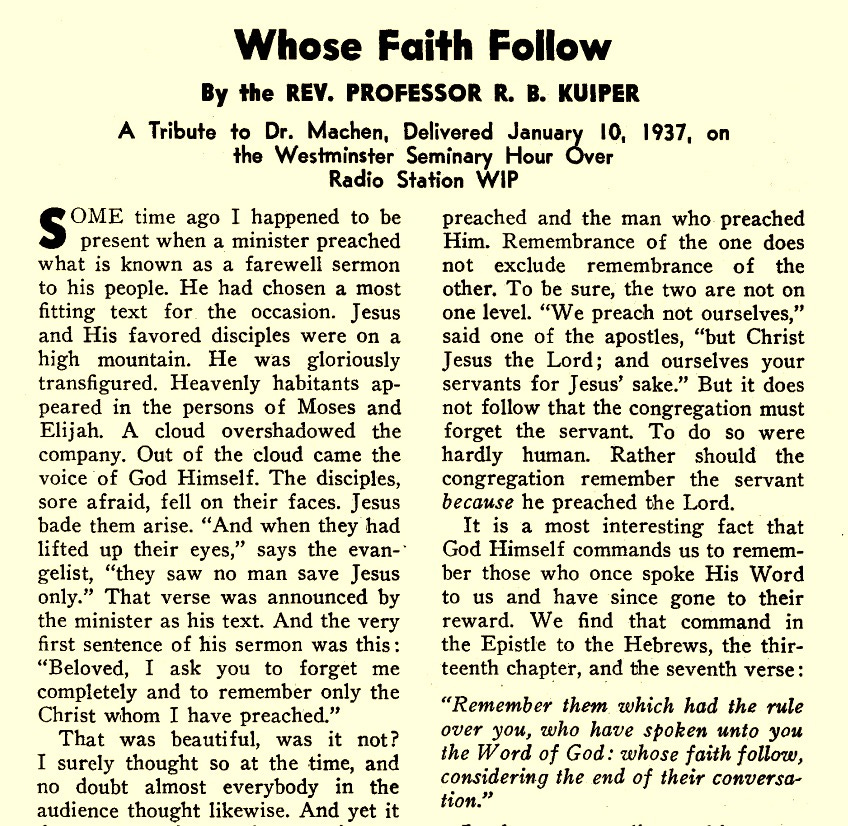Was Machen a Martyr?
His colleague Kuiper said no...and yes
J. Gresham Machen died 88 years and two days ago. His Westminster Seminary colleague, Dr. R. B. Kuiper, gave a Philadelphia radio talk nine days after Machen’s untimely death. We’ll look at an interesting section of that talk, the full transcript of which can be read here.
Machen—a son of privilege, of a patrician family, with a world-class education—could have maintained what one of his mentors called a "condition of low visibility"1 in the courts of the church and in the halls of Christian education. However, because of his love for Christ and his church, he chose the hard road of faithfulness to the Bible and the Reformed faith. His convictions were too hard-won to be quickly abandoned.2
Shall we call Dr. Machen a martyr? I am not at all certain that he considered himself worthy of that name. He did not have a martyr complex. He did not invite martyrdom, nor did he boast of it. He was far too sane to do any such thing. There was nothing of the fanatic about him. And yet, without the slightest hesitation I give him a place among the martyrs of the Christian Church. What abuse has not been heaped upon him! I seriously question whether any religious leader of our day was more maligned than he. To him applies the beatitude: "Blessed are ye when men shall revile you and persecute you and say all manner of evil against you falsely for My sake." What heroism of faith he manifested in the defense and proclamation of the Reformed Faith!
According to worldly wisdom, his struggle in the massive mainline northern Presbyterian church was quixotic, but he never manifested a savior complex or fancied himself to be an Old Testament-type prophet, though their examples clearly inspired him.
He was not afraid of being in the minority. How he liked to preach on the text, "There is no restraint to the Lord to save by many or by few"! What comfort he derived from the story of Gideon and his three hundred! It is interesting that he feared more that The Presbyterian Church of America might be too large than that it would be too small. He knew all the time that he represented a numerically little, almost negligible, group in the Presbyterian Church in the U.S.A. But he also knew that God and one are a majority.
He did not take the path of least resistance. He never said, as many say in effect: If I proclaim the truth in my own sphere of labor, I am doing my whole duty; I am not responsible for what other ministers preach. He realized that he was his brother's keeper. He had a burden for souls. He felt that he was sinning if he did not protest in the most vigorous way against the betrayal of precious souls by a false gospel. Nor did he take refuge in what some please to call positive, uncontroversial preaching. He remembered the words of Jehovah to His servant Ezekiel about the watchman who fails to warn the people of the approaching foe and at whose hand their blood will therefore be required.
This is a fascinating quote: “It is interesting that he feared more that The Presbyterian Church of America (which was renamed the Orthodox Presbyterian Church) might be too large than that it would be too small.” The slowness of the OPC’s growth and its modest cultural ambitions caused numbers to leave the OPC over the years. A few went back to the mainline, and (much later) many of the “New Life” OPC churches joined the Presbyterian Church in America, whose ambitions for cultural influence and growth have never been hidden and whose openness to diverse worship and practice some found appealing.
From the first paragraph of Christianity and Liberalism:
The purpose of this book is not to decide the religious issue of the present day, but merely to present the issue as sharply and clearly as possible, in order that the reader may be aided in deciding it for himself. Presenting an issue sharply is indeed by no means a popular business at the present time; there are many who prefer to fight their intellectual battles in what Dr. Francis L. Patton has aptly called a "condition of low visibility." Clear-cut definition of terms in religious matters, bold facing of the logical implications of religious views, is by many persons regarded as an impious proceeding. May it not discourage contribution to mission boards? May it not hinder the progress of consolidation, and produce a poor showing in columns of Church statistics? But with such persons we cannot possibly bring ourselves to agree. Light may seem at times to be an impertinent intruder, but it is always beneficial in the end. The type of religion which rejoices in the pious sound of traditional phrases, regardless of their meanings, or shrinks from "controversial" matters, will never stand amid the shocks of life. In the sphere of religion, as in other spheres, the things about which men are agreed are apt to be the things that are least worth holding; the really important things are the things about which men will fight."
During his studies in Germany during the first decade of the 20th century, Machen struggled with the appeal of the most eloquent proponents of Protestant liberalism, but he eventually rejected their claims. This experience positioned him uniquely well to oppose the liberalism that took over the PCUSA, as typified by the Auburn Affirmation.



Unfortunately, I have not found just yet a Machen look-alike in the Presbyterian denomination. ( a see a few in the Reformed Baptist camp). Could you name one who is fighting off, in words and actions, the ‘social justice’ issue please? Thanks!